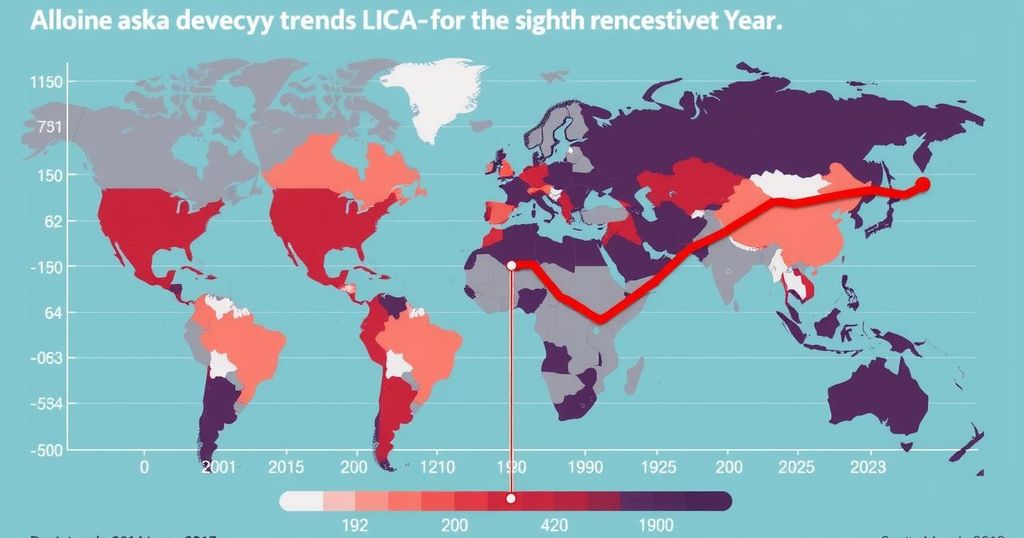Democracy has declined globally for the eighth consecutive year, with significant reductions in credible elections and voter turnout. One in three elections is disputed, and almost half of the analyzed countries show a decline in democratic practices, with various regions facing unique challenges. The report stresses the urgent need for reforms to safeguard democratic processes.
A recent report from the International Institute for Democracy and Electoral Assistance (International IDEA) indicates that democracy has experienced a continuous decline for the eighth consecutive year globally. The report highlights a significant drop in credible elections and parliamentary oversight, which the organization attributes to various factors such as governmental intimidation, foreign interference, and the manipulation of disinformation and artificial intelligence during electoral campaigns. Alarmingly, the average voter turnout has decreased from 65.2% in 2008 to a mere 55.5% in 2023, and currently, one in three elections are contested in some manner.
According to Kevin Casas-Zamora, Secretary-General of International IDEA, “Elections remain the single best opportunity to end democratic backsliding and turn the tide in democracy’s favor. The success of democracy depends on many things, but it becomes utterly impossible if elections fail.” The report emphasizes that 47% of the 158 analyzed countries have faced declines in key democratic indicators over the past five years, marking an alarming trend in global democratic governance.
The findings are particularly dire for the year 2023, which has been deemed the worst for free elections and parliamentary oversight, showcasing trends that are prevalent in both established democracies and vulnerable governments alike. In regions such as Africa and Western Asia, significant discrepancies in democratic practices are noted, with recent performance declining sharply in coup-affected areas such as Burkina Faso. Conversely, improvements were observed in nations like Burundi and Zambia.
In Europe, there are widespread declines in democratic principles including the rule of law and civil liberties, although some progress has been acknowledged in Montenegro and Latvia. The Americas largely exhibit stability; however, concerning declines in rule of law and civil rights have been marked in Guatemala, Peru, and Uruguay. In the Asia-Pacific region, while many nations have seen either minor declines or stability, notable improvements have been recorded in countries including Fiji, the Maldives, and Thailand, juxtaposed against significant regressions in Afghanistan and Myanmar.
These findings shed light on a daunting reality of global democratic erosion, underscoring the critical need for reforms and vigilant safeguarding of democratic processes and institutions.
The ongoing decline of democracy worldwide has become a pressing concern amid various geopolitical changes. The International IDEA’s recent Global Report on the State of Democracy indicates severe challenges affecting elections, influenced by factors such as political repression, misinformation campaigns, and external interference. The institute’s mandate is to support and promote democratic governance and human rights through research and advocacy, making these findings particularly relevant for policymakers and civil society organizations dedicated to fortifying democratic institutions.
In conclusion, the International IDEA report illustrates a troubling trajectory of democracy globally, characterized by declining voter participation, increasing electoral disputes, and significant governmental and foreign interferences. With nearly half of the scrutinized countries exhibiting democratic backsliding and further challenges in traditional democracies, there is an urgent call for collective action to restore and protect electoral integrity and democratic norms. The findings underscore the necessity for stakeholders at all levels to actively engage in averting a deeper democratic crisis.
Original Source: apnews.com






